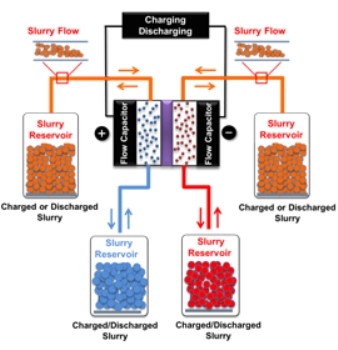Scientists at Drexel University's College of Engineering have developed a scalable solution for rapidly and effectively storing electrical energy in huge quantities by integrating the principles of supercapacitors and batteries.
 The electrochemical flow capacitor technology, developed at Drexel, could be a solution to using renewable energy sources such as wind and solar power.
The electrochemical flow capacitor technology, developed at Drexel, could be a solution to using renewable energy sources such as wind and solar power.
The researchers have proposed an idea to integrate an electrochemical storage system into the grid. This unique solution may help renewable energy sources like wind and solar power to be used more widely. The ‘electrochemical flow capacitor (EFC)’ comprises an electrochemical cell linked to two external electrolyte reservoirs. This design is analogous to current redox flow batteries utilized in electrical vehicles. This innovative technology utilizes tiny carbon particles dispersed in the electrolyte to form a slurry of particles capable of transferring an electrical charge. The uncharged slurry is then transferred to a flow cell, where the carbon particles get charged through the transfer of energy accumulated in the cell. This charged slurry can then be stocked up in tanks until the energy is required, during which time the whole process is reversed for discharging the EFC.
The EFC’s unique design enables it to be built to a size that is large enough to stock up energy in huge quantities, while also enabling rapid supply of the energy based on the demand. In flow battery systems and EFC, and the size of the tanks that reserve the charged material determines the energy storage capacity, and the electrochemical cell’s size determines the system’s output power. This means that the larger the cells, the more the output power.
This innovative design also provides the EFC a longer operating life than existing flow batteries. The EFC demonstrates several thousands of charge-discharge cycles in stationary applications, said the researchers. This technology is capable of handling cost and lifespan challenges associated with existing electrochemical energy storage technologies. Dr. E.C. Kumbur, one of the researchers, reported that flow battery design is suitable for grid-scale applications as it enables scalable energy storage through the decoupling of energy density and power.
The researchers have reported their energy storage concept in a special issue of Advanced Energy Materials. At present, they are working on the development of new slurry compositions using different types of electrolytes and carbon nanomaterials to make the technology feasible as well as to improve their flow capacitor design. They are also creating a small demonstration prototype to exemplify the basic process of the system.